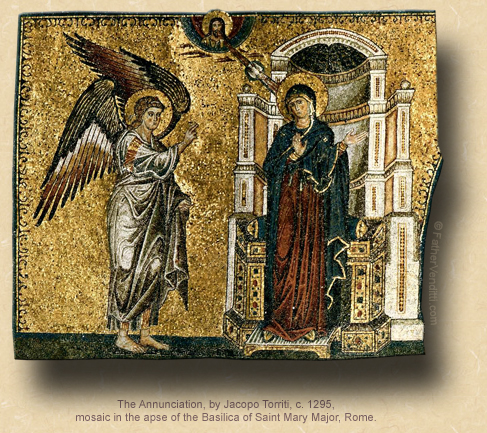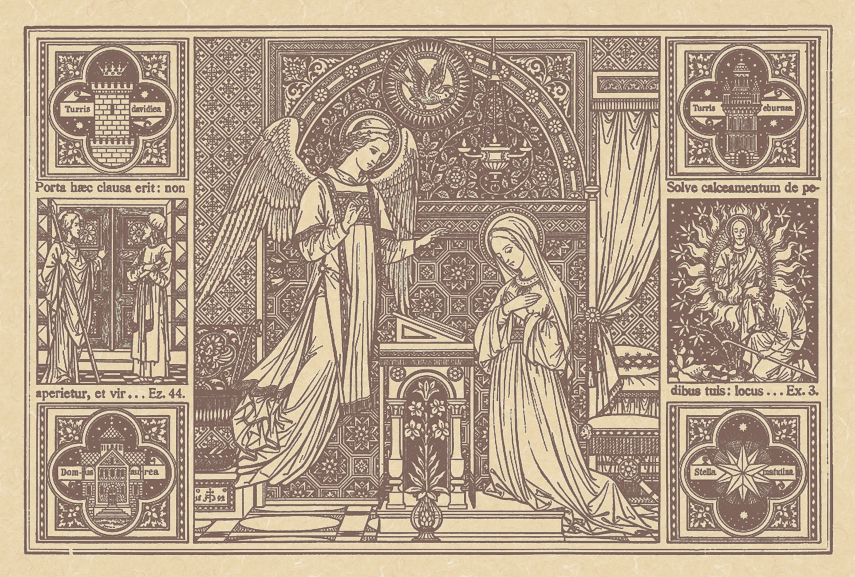Be Not Afraid!
The Solemnity of the Annunication of the Lord.*
Lessons from the proper, according to the ordinary form of the Roman Rite:
• Isaiah 7: 10-14; 8: 10.
• Psalm 40: 7-11.
• Hebrews 10: 4-10.
• Luke 1: 26-38.
The First Class Feast of the Annunciation of the Blessed Virgin Mary.*
Lessons from the proper, according to the extraordinary form of the Roman Rite:
• Isaiah 7: 10-15.
• [The Gradual is omitted.]
• [The Tract is omitted.]
• Luke 1: 26-38.
Thomas Monday; and, the Feast of Our Venerable Fathers Joseph the Hymnographer & George of Maleon.
Lessons from the pentecostarion, according to the Ruthenian recension of the Byzantine Rite:
• Acts 3: 19-26.
• John 2: 1-11.
FatherVenditti.com
|
 10:46 AM 4/4/2016 — Ordinarily, as you know, the Annunciation is celebrated on March 25th, but when it falls during Holy Week, as it did this year, it's transferred to today, the Monday after Low Sunday. In the Byzantine Church in which I used to serve, it's never transferred so as to preserve the notion of our Blessed Mother conceiving our Lord exactly nine months prior to His nativity. 10:46 AM 4/4/2016 — Ordinarily, as you know, the Annunciation is celebrated on March 25th, but when it falls during Holy Week, as it did this year, it's transferred to today, the Monday after Low Sunday. In the Byzantine Church in which I used to serve, it's never transferred so as to preserve the notion of our Blessed Mother conceiving our Lord exactly nine months prior to His nativity.
There shouldn't be much of a homily required for today's wonderful feast. Every day, when we pray together the Angelus before Mass outside the Easter season, we are reminding our Lady of this moment, and every time we meditate on the first Joyful Mystery of the Rosary, we are reminding Her of it again; so, for those of us who love and venerate the Mother of God, the Annunciation is always fresh in our minds. Her docility to the will of God, delivered to Her by an angel, harkens back to a similar attitude taken by the man who would soon after this become Her husband, from whom we drew the same lesson on his feast earlier this year; so, the brief thoughts I have to share with you may seem familiar, not simply because I've shared them with you before, but because the Annunciation is a mystery constantly in the thoughts and prayers of all of us.
Make no mistake: the Blessed Virgin did not ask to be the Mother of God; She didn't apply for the job, in spite of the fact that God prepared Her for it by Her Immaculate Conception. I fear sometimes that we so mystify and embellish the saints so as to think that their wills were somehow less free than ours, and that tasks which they appear to embrace without anxiety—so fancily and histrionically written about in your Lives of the Saints—came easily to them because of their holiness. Even the Mother of God, conceived without sin, was not immune to human doubt and human fear, otherwise She wouldn't have been human.
That's why Mary's life is the perfect example for all of us. Just as it was for Her, the circumstances of our lives are often not choices we make for ourselves, and we may very well doubt our ability to be faithful in the difficulties they present. But as our Lord said in Saint John, “It was not you that chose me, it was I that chose you” (John 15: 16 Knox); and, because He has chosen us, He will not abandon us. We can pretend that He has, because we don't want to admit to our failures. But that's only because we forget that the gift of Sufficient Grace is not a guarantee that our lives will be problem free. Our Lord said that himself: “If any man has a mind to come my way, let him renounce self, and take up his cross daily, and follow me” (Luke 9: 23 Knox).
Now, those words may not sound particularly pleasant to us, but what the angel said to Mary at Her Annunciation, our Lord has also said to each one of us: He said it to me on the day I was ordained, He said it to many of you on the day you were married, He said it to each one of us on the day of our baptism: “Be not afraid.”  If you go to a web site that searches Bible verses for you—and there are a few out there—and type in that phrase, you'll get hundreds of citations; I don't think there's a phrase that occurs more often throughout both the Old and New Testaments than “Be not afraid.” That one simple sentence, spoken by God through all eternity, sums up the entire Gospel on the subject of grace. If you go to a web site that searches Bible verses for you—and there are a few out there—and type in that phrase, you'll get hundreds of citations; I don't think there's a phrase that occurs more often throughout both the Old and New Testaments than “Be not afraid.” That one simple sentence, spoken by God through all eternity, sums up the entire Gospel on the subject of grace.
But so often we are afraid. We’re afraid of obligation. We’re afraid of sacrifice. And to overcome this fear we have to accept what we so often don't want to accept, especially when things aren't going that well: that God has not abandoned us. We must respond as Mary did: “…let it be unto me according to thy word.” Saying that did not mean that Mary understood it all, and I think it is unreasonable to assume that She did, for She did not have clairvoyance. What she did have was faith. Faith enough to say, " I will not be afraid." Just as we must say every single day: I will not be afraid of following the Lord. I will not be afraid of responsibility and obligation. I will not be afraid of living with a sudden and unexpected loss. I will not be afraid of marriage. I will not be afraid of the priesthood. I will not be afraid of the Gospel. I will not be afraid of the cross. I will not be afraid of things not going my way. I will not be afraid of doing what is right, no matter what the consequences. I will not be afraid of life.
There is an episode from Matthew's Gospel that keeps popping up in my mind whenever I pray the first Joyful Mystery, even though it has nothing to do with the Annunciation; it's our Blessed Lord casting a devil out of a young man:
And Jesus checked him with a word, and the devil came out of him; and from that hour the boy was cured. Afterwards, when they were alone, the disciples came to Jesus and asked, “Why was it that we could not cast it out?” Jesus said to them, “Because you had no faith. I promise you, if you have faith, though it be but like a grain of mustard seed, you have only to say to this mountain, 'Remove from this place to that,' and it will remove; nothing will be impossible to you” (Matt. 17: 17-19 Knox).**

* It is a peculiarity of the Missal of Bl. Paul VI that the Annunciation is designated as a feast of our Lord. All other liturgical traditions, including the Missal of St. John XXIII, designate it as a feast of our Lady; however, far from being a slight to the Mother of God, the reason for this may be that, as a feast of the Lord, it would take precedence over a Sunday of Lent without having to be transferred. In any case, while the announcement is being made to Mary, it is Her Son's arrival that is being announced; so, either designation seems appropriate theologically.
In the Byzantine-Ruthenian Rite, the Annunication is never transfered, even if it occurs during Holy & Great Week, in which case it's celebration is combined with whatever Great Week service is prescribed.
** Consistent with the practice of the time, Msgr. Knox does not use quotation marks in his translation; rather, he sets apart direct quotations by capitalizing the first word of the quote. Whenever I cite his translation, I add the punctuation for the sake of clarity.
|

